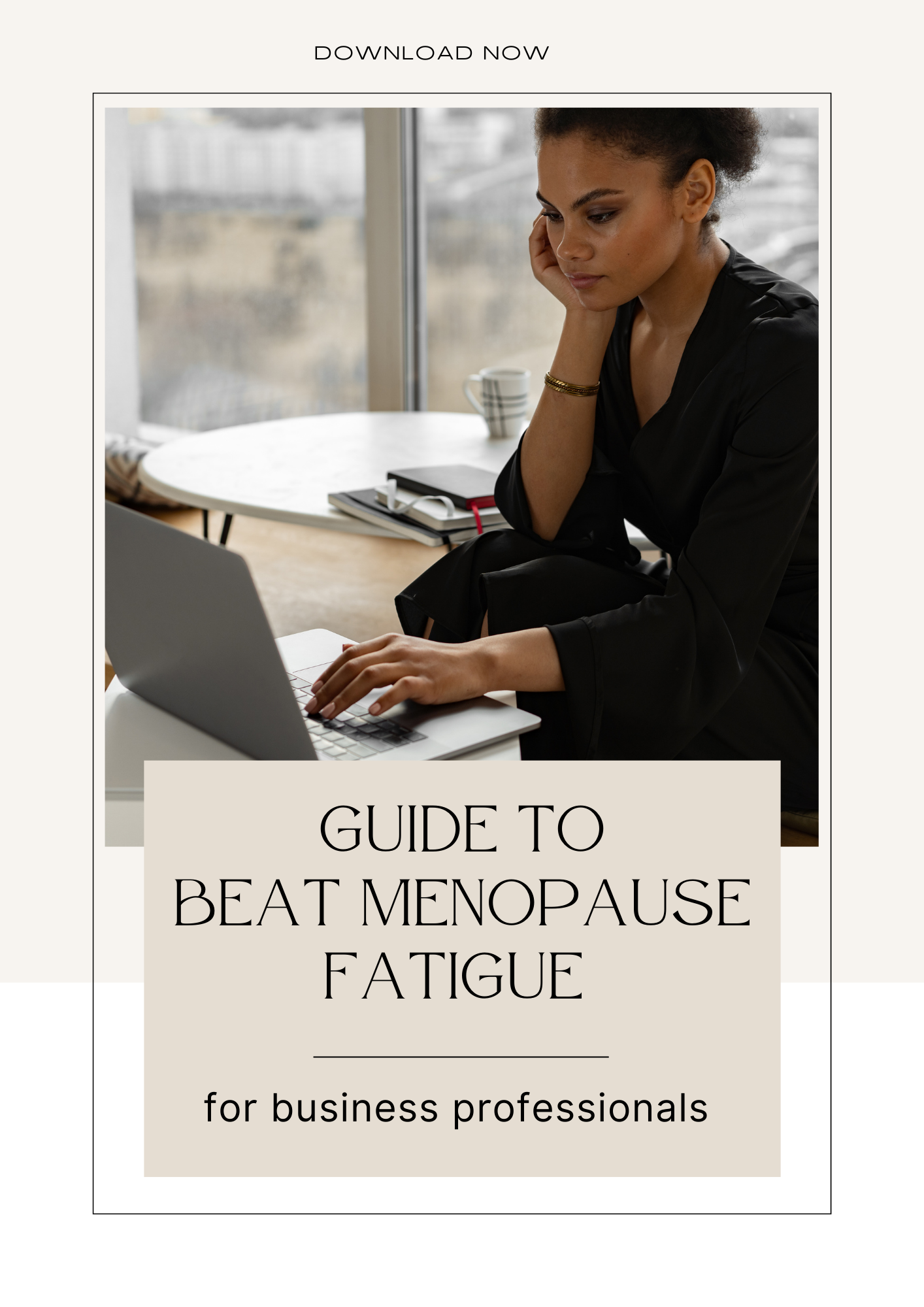
How to Manage Menopause Symptoms Without The Use Of Hormones
Apr 19, 2023
I remember when I first started my menopause journey. I was about two years ago, and at first, I didn't notice any significant changes. But then, the hot flashes started. And the night sweats. And the mood swings.
I also found myself struggling with insomnia and fatigue. I was exhausted all the time, and I couldn't seem to get a good night's sleep. It was taking a toll on my physical and emotional well-being.
To make matters worse, I had just taken on a new role as a caregiver for my mother-in-law, who has mid-dementia. It was a lot to handle, and I felt like I was drowning.
I started to feel like I was losing control of my life. My body was changing, my emotions were all over the place, and I was exhausted all the time. I didn't know what to do.
But then, I started to do some research. I learned that menopause is a natural part of life, and that there are things I could do to manage my symptoms. I started to make changes to my diet and exercise routine, and I found some natural remedies that helped to relieve my hot flashes and night sweats.
It wasn't easy, but I started to feel like myself again. I was able to get a good night's sleep, I had more energy, and my mood started to improve. I was finally taking control of my menopause journey.
If you're going through menopause, I want you to know that you're not alone. It's a challenging time, but it's also a time of transition. You're becoming a new version of yourself, and it's okay to feel lost and confused at times.
Menopause is not a destination, it's a journey. And it's a journey that you can take control of. So don't give up. Keep moving forward, and don't be afraid to ask for help.
Here are some additional tips that may help you manage your menopause symptoms:
#1. Menopause is a natural part of life, but it can also be a time of great stress.

When you are caring for an aging parent, you will naturally feel stress. And stress can worsen your menopause symptoms, which is why it's important to develop mindfulness practices to you help manage stress and minimize any discomfort that it causes."
Some of my favorites mindful practices that always works:
- Meditating for 10-15 minutes each morning or during a break.
- Color therapy while listening to music that feels good to my soul.
- A relaxing hobby, doodling or painting and sometimes working with crafts.
- Deep diaphragmatic breathing throughout the day for stress reduction.
- Spending time with friends and loved ones or scheduling dedicated “me-time.”
Mindfulness is the practice of paying attention to the present moment without judgment.
When you are mindful, you are aware of your thoughts, feelings, and sensations without getting caught up in them.
Mindfulness is a powerful tool that can help you to manage stress and improve your overall well-being. If you are struggling with menopause symptoms, I encourage you to try some mindfulness exercises. You may be surprised at how much they can help you to cope in the stress that you have now.
Remember, you are not alone. Menopause is a natural part of life, and there are many things that you can do to manage stress and improve your overall well-being.
#2. Menopause: A Time for Self-Care - keeping hormones balanced
One of the most crucial factors influencing your body's response to menopause is your diet. A balanced and nutritious diet can significantly reduce symptoms such as hot flashes, mood swings, and weight gain.
With your busy schedules, making healthy choices might be difficult at times. Focus on foods rich in calcium, iron, and fiber; consume plenty of fruits, vegetables, and whole grains; and prioritize lean protein sources. Limit processed foods, refined sugars, caffeine, and alcohol, as these can trigger or exacerbate symptoms.
Picture this: You wake up feeling refreshed, your skin glowing, and your mind clear to tackle the day.
You may not think about this often but the power of a balanced diet can not only transform your energy levels but also keep your hormones in check so that you can live the life you deserve.
Now, my friend, let's not just imagine that reality, let's create it!
I'm talking about consuming this one your daily menu:
- A vibrant tapestry of fruits and vegetables that are packed with essential micro and macro nutrients
- Flavorful delectable whole grains that support your gut health that you absolutely love.
- Nourishing proteins filed with aromatic spices that help build and maintain strong muscles in menopause.
Fueling your body's temple with these powerhouse ingredients is the greatest gift you can give yourself. Drink in the vitality of life by staying hydrated and take a proactive approach to maintaining balance in every aspect of your journey.
Remember, the best version of you resides just on the other side of the conscious choices you make daily. Drinking plenty of water can help relieve menopause symptoms like hot flashes and night sweats.
So eat right, stay hydrated, and live your best life! :)
#3. Sleeping Through Menopause- the lost art of sleep
When I started menopause I notice that sleep disturbances became a regular annoyance that seems to be common for most women in menopause, which is often caused by night sweats and stress.
The only way I've discovered to truly improve your sleep quality is by establishing a consistent bedtime routine, including a relaxing pre-sleep ritual, such as reading, listening to calming music, or taking a warm bath. During my wind-down. ritual I have myself a warm cup of tea made with drops of tinctures or dried herbs.
Now, as much as I enjoy a bold red glass of wine, it's in my best interest to avoid caffeine, or alcohol. I will have a glass, just not every evening. When I do it's always with food since the notes of the wine and my food only enhances each other. Most time when I have wine it is never close to bedtime but during a late lunch, typically 4pm unless I'm out for dinner which typically is around 7pm. If I have something heavy close got bed it always disrupts my sleep.
Lastly, equip your sleeping environment with comfortable bedding and temperature-control devices like cooling pillows, moisture-wicking sheets, or an adjustable in-room air conditioner. Once I put these things in place I was able to get into REM sleep without waking up too often from night sweats.
Here are some additional tips that may be helpful for women caring for aging parents:
- Set boundaries. It is important to set boundaries between your caregiving responsibilities and your own personal needs. This may mean saying no to requests from your parents or asking for help from others.
- Take care of yourself. It is important to make time for self-care, even when you are busy caring for others. This would include getting enough sleep, eating a healthy diet, and exercising regularly.
- Find a support system. Talking to other women who are going through the same thing can be helpful. There are also a number of support groups available online and in your community.
Caring for aging parents can be a challenging but rewarding experience. By following these tips, you can improve your sleep quality and reduce stress, so that you can better care for your loved ones.
#4. Supplement Your Diet - omega rich 3 fatty acids, probiotics, and vitamin D
Did you know that menopause, although a natural phase in our lives, may bring with it various challenges that can leave our bodies seemingly off-balance?
Fear not darling! I have great news for you.
While replacing hormones through medical treatment is one way to manage your menopause symptoms, there are several natural remedies and supplements that can provide relief without the potential side effects.
These include herbal supplements such as black cohosh, chasteberry, red clover, evening primrose oil, or soy isoflavones, which can help alleviate hot flashes and mood swings. However, always check with a healthcare professional before starting any new remedy, because some supplements can interact with medications, food or have contraindications based on your medical history.
It's absolutely possible to supplement your diet to support your body during this time. However, as I previously mentioned it is important to consult with a trained herbalist, naturopathic doctor or acupuncturist first before using any natural remedies.
Embrace the power and benefits of supplements like:
- Omega-3 fatty acids, which can help with mood swings and reduce inflammation.
- Probiotics, those friendly little bacteria that work wonders on our digestive systems, helping to stabilize hormone levels.
- The ever-important role of Vitamin D - it aids in maintaining healthy bones and mood during menopause.
Sisters, you deserve to feel vibrant and unstoppable, regardless of the stage of life you're in - and a well-rounded diet with added supplements is an excellent way to support your changing bodies.
Remember, you truly are what you eat, so nourish yourself with love and care from within!
#5. Find Support - connect with others going through the same
When you face life's challenges, it is essential to remember that you are never alone. There's an extraordinary power in connecting with others who are going through similar experiences.
By sharing your stories, your fears, your triumphs, and even your tears, you create a nurturing community where you can reduce feelings of isolation and foster healing.
Just as a single tree may struggle against the wind, a forest of connected spirits offers mutual support and strength. So, reach out to the ocean of kindhearted souls around you and discover the beauty of emotional solace that lies within our interconnectedness. CLICK HERE TO DOWNLOAD YOUR GUIDEBOOK NOW
"Together, we are capable of weathering any storm and embracing the brilliant light that awaits on the other side of life's clouds".
#6. Practice Self Care - give yourself permission to make time for YOU
It's essential to give yourself permission to practice self-care and carve out precious moments from your busy lives for much-needed nurturing.
Activities like meditation and journaling can provide tremendous emotional support when your hearts and minds are overburdened. The beauty of meditation lies in its simplicity - a few moments of stillness and deep breathing can have a profound impact on your wellbeing. Taking up relaxing activities such as deep breathing exercises or mindfulness-based practices can help you reduce stress levels and alleviate menopause symptoms like insomnia and anxiety.
Similarly, journaling allows you to uncover your emotions, fears, and desires and gather a deeper understanding of yourself, helping you grow stronger and more resilient over time.
Contrary to what many believe, self-care isn't a luxury - it's an integral aspect of being your best selves and shining your brightest light into the world.
As my life coach so beautifully articulates...
"self-care is the foundation upon which our ability to thrive and contribute positively to the lives of others is built".
Menopause can often be overwhelming and sometimes feel like more of a transition than it really is.
But by taking action proactively, you can ease many of the symptoms associated with the process. Acknowledge your feelings an take time for yourself, get moving and eat right, supplement your diet where necessary and find support from others.
Cultural conditioning tells us to transact this journey alone, but nobody should have to go through menopause without help or understanding.
You have to allow self-care to become a priority – recognize your worth and give yourself permission to take care of yourself!
We’re all entitled to experience a little joy, so try activities that are near and dear to my heart such as meditation or journaling that can bring you peace.
As women, let’s make menopause part of life’s celebration rather than something to survive.
Transitioning through menopause is a unique experience for every woman, and successful management of its symptoms means finding the strategies that work best for you. By implementing a balanced diet, staying active, practicing stress management, prioritizing sleep, and exploring natural remedies, you can navigate menopause without relying on hormone therapy.
Of course, if the above methods don't work, speak to your doctor about other non-hormonal treatments for managing menopause symptoms., it's your choice. My mission is to help you ease into menopause holistically.
Embracing these lifestyle strategies will not only help you cope with the challenges brought on by menopause, but will also empower you to maintain your overall health, well-being, and professional success through this transitional period and beyond.
Menopause is an inevitable stage in you life, but it doesn't have to be a miserable one. The fatigue, mood swings, and hot flashes can make you feel like you're losing their vitality and self-assurance.
That's why I created a comprehensive guidebook that offers practical advice on how to beat menopause fatigue the chic way.
This guidebook features natural remedies, gourmet dining options that are delicious and healthy, and lifestyle changes that can make a real difference in how you feel.
Whether you're just starting to experience symptoms or you've been dealing with menopause for a while, our guidebook can help you unlock the secrets to reclaiming your energy and confidence.
Don't suffer in silence - get the 'Beat & Conquer Menopause Fatigue' Ebook now and start feeling like yourself again..
Let me know in the comments if this helped, and let me know what are you doing that makes you feel better during this stage of life! CLICK HERE TO DOWNLOAD YOUR GUIDEBOOK NOW


